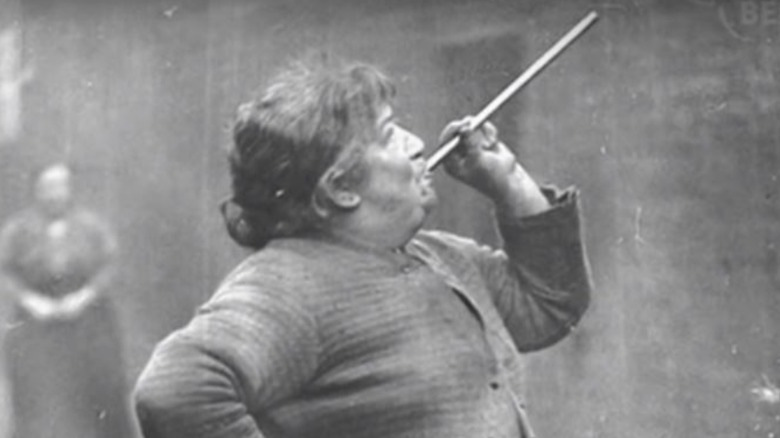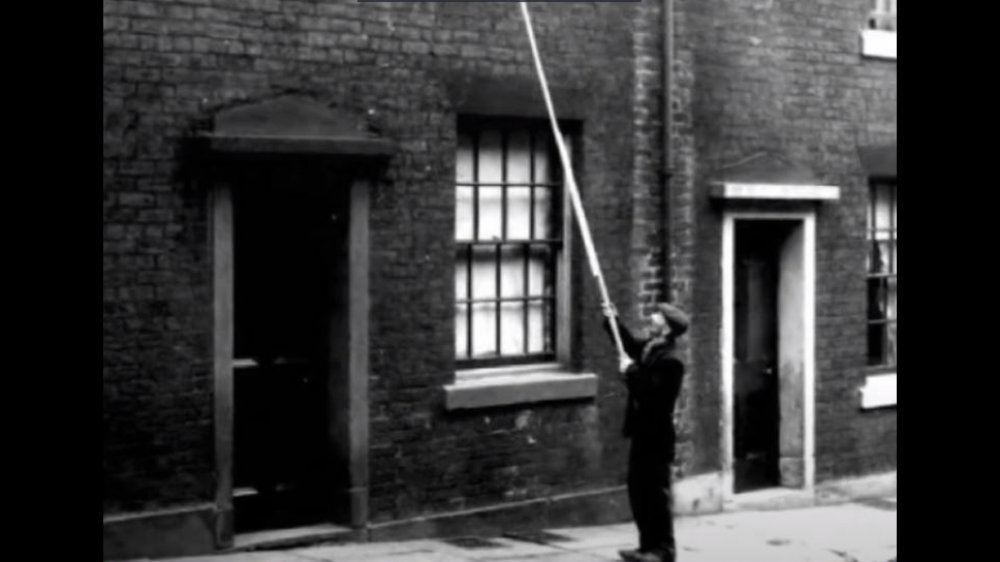The Unusual Career That Was Made Obsolete By Alarm Clocks
Typically, if someone prowled the streets before sunrise rapping on peoples' windows with a big, long stick, there'd be cause for concern. Imagine, though, that this pre-dawn lurker is not a reason to call 911 or scramble for the family firearm, but is being paid to knock on your window. In fact, the person is being paid by you, and is part of a legitimate, even generational vocation where people do the task, modernly, relegated to face-licking cats or dogs (or alarms on your phone, of course). Every morning, the "knocker upper" strolls by your house, and tap, tap, tap, time to go to work.
This was exactly the case up through the 1930's and 40's in England, as reported by the BBC. Knocker uppers (nothing to do with pregnancy, we assume) were at their height towards the end of the 19th century, when shift work became the norm, especially around the docks in London. As a professional knocker reported to the Huron Expositor in 1878, they used to simply knock on people's doors or ring doorbells, but because of noise complaints developed the stick-on-window method. Some used hammers, rattles, or even pea shooters. This was for financial reasons more than anything else, though, because everyone had to pay for their services separately.
Knocker uppers were such a normal part of life that they were mentioned in popular literature of the time, such as that of Charles Dickens in Great Expectations, as well poems like "The Knocker's" by Mike Canavan.
Knock, knock, who's there?
It makes sense that busy city life might necessitate being knocked upped more than the country, but actually, knocker uppers tapped their trade in small villages, as well. Some knocker uppers, especially the final ones, became mini-celebrities, such as Granny Cousins (Caroline Jan Cousins, 1837 – 1927), who, according to Dorset Ancestors woke up brewers for twenty years through the end of World War I. Then there was Mrs. Bowers from Sacriston who woke up at 1am and roamed the streets with her dog Jack to wake miners on early shifts. Mary Smith and her daughter, of the same name, were among the last knocker uppers in London, and were well-known around the city for their pea shooter wake-up calls. Smith earned sixpence a week (1/40th of £1).
Knocker uppers, by all accounts, were simply night owls working the graveyard shift. The question of "who knocks up the knocker uppers," though, was part of a common joke at the time, memorialized in tongue-twister form:
We had a knocker-up, and our knocker-up had a knocker-up
And our knocker-up's knocker-up didn't knock our knocker up
So our knocker-up didn't knock us up
'Cos he's not up.
According to Etymonline, "knock up" was used as a verb all the way back to the mid-1600's to describe being woken up by a knock at the door. By the time the Industrial Revolution rolled around, it was time for these stalwart warriors of the dawn to strut their stuff.

